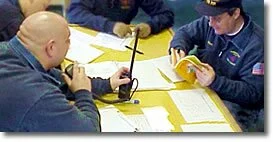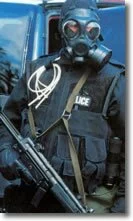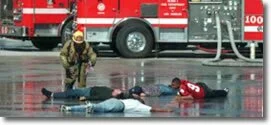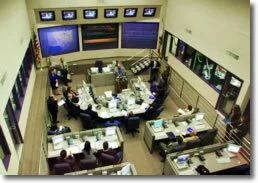  |

|
EMAC International is a premier provider of comprehensive and cutting edge Hands-On Incident Response and Command Management Training Scenarios and Tabletop Exercises for a wide variety of clients, agencies and end-users. These training programs and exercise modules incorporate traditional tabletop scale model scenarios and dioramas with cutting edge integrated technology. This will provide the participants with skill set development opportunities to further enhance their respective job responsibilities in the areas of strategic, tactical, administrative, managerial or support functions within the broad field of emergency management preparedness, operations and training development. |
|
National Incident Management- NIMS Alignment
Structured under the emerging National Incident Management Systems (NIMS), the comprehensive collection of REACT™ training simulator modules are modified and defined to meet the specific training needs of our clients and their emergency management, response and command requirements. REACT™ simulator modules allow participants to learn or refresh on existing ICS/ NIIMS, or develop capabilities under the new NIMS command management protocols, where they can integrate site-specific, local or regional emergency response protocols, procedures and deployment standards. EMAC International closes the gap between your command and emergency management needs and the operational proficiencies expected in today’s demanding emergency management profession. The Response and Command Training simulator modules provide your agency or organization with the ability to transition existing ICS management protocols and procedures into the new NIMS systems. They use a highly effective training method that integrates dynamic individual and group participation demands. It builds on the transition from your current ICS protocols to NIMS and provides proficiency skill development to prepare the student to implement these at actual incident events. |
|
|
|
|
EMAC International brings our REACT™ Simulator Modules directly to your location. We can accommodate single client deliveries, local, regional, multiple agency or departmental program facilitations. Our programs are designed for basic, intermediate or advanced level content. The programs are flexible and cost-effective based upon the client’s specifications. We integrate traditional strategic, tactical and management skills development with cutting edge, hands-on training in a controlled environment. Our primary objective: to increase participant skills and capabilities for future incidents.
![]() Command Institute- NIMS Training Series Alignment
Command Institute- NIMS Training Series Alignment
Aligned with our Command Institute NIMS Training Series, the REACT™ simulator modules address a wide latitude of emergency management, strategic, tactical, administrative, and managerial or support function deliveries. The programs can be designed for delivery to audience groups of 10 – 200 participants.
|
REACT™ Hands-On Simulator Modules are designed for: |
The Response and Command Training programs developed by EMAC International are unsurpassed in content, technical quality and instructional delivery excellence, integrating the most current provisions of the new NIMS system. And EMAC International will meet your needs regardless of your organizational size or complexity. Our programs will fit any of the following: small volunteer fire department; suburban, municipal or county fire service; EMS or emergency management agency; small or large hospital; educational facility or institution; corporate headquarters; business or industrial facility; or governmental agency.
EMAC International will work closely with your agency to develop and coordinate a training program that not only addresses local and site-specific needs, but also integrates the expanding knowledge base of national and international case-studies. We want to help you expand your competencies and skill development. Contact EMAC International to discuss your specific training needs and to explore our wide array of program offerings.
Examples of Core REACT™ Tabletop Simulator Modules
|
Fire, Rescue or EMS Deployment Incident Scenarios |
|
Law Enforcement Agencies |
|
Educational and School Institutions |
|
Hospital, Medical, Research and Health Care Providers |
|
Emergency Operations Center Operations and Management |
EMAC International has the proven ability and technical expertise to provide your agency and personnel with an exceptional and rewarding hands-on training experience. Our programs integrate traditional, strategic, tactical, and management skills development with cutting edge hands-on training in a controlled environment. We want to challenge and bring the best out of each participant. Our primary objective: to increase participant skills and capabilities for the challenges of future incidents.
 |

|
|
|
|
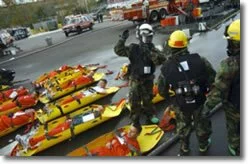
|
 
|
  The functional exercise (FE), also known as a command post exercise (CPX), is designed to test and evaluate individual capabilities, multiple functions or activities within a function, or interdependent groups of functions. Functional exercises are generally focused on exercising the plans, policies, procedures, and staffs of the direction and control nodes of Incident Command (IC) and Unified Command (UC). Generally, events are projected through an exercise scenario with event updates that drive activity at the management level. Movement of personnel and equipment is simulated. The objective of the functional exercise is to execute specific plans and procedures and apply established policies, plans, and procedures under crisis conditions, within or by particular function teams. A functional exercise simulates the reality of operations in a functional area by presenting complex and realistic problems that require rapid and effective responses by trained personnel in a highly stressful environment. |
|
|
|
 
A full-scale exercise provides an opportunity to execute plans, procedures, and cooperative (mutual aid) agreements in response to a simulated live event in a highly stressful environment.
|
 |
 |
 |
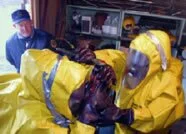 |
 
EMAC International will coordinate and assist our clients with program management functions starting with a plan, a budget, or a funding source, exercise execution; and with improvement planning. Program management involves several elements including project management, budgeting, grant management, staff hiring, funding allocation, exercise planning, exercise conduct, reporting, improvement tracking, and expenditure tracking.
|
|
To schedule or inquire about REACT™ Response and Command Training,
please contact us. |
|
|






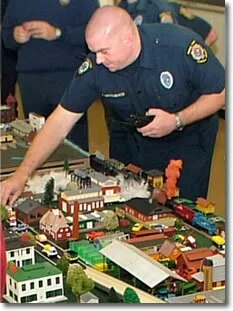
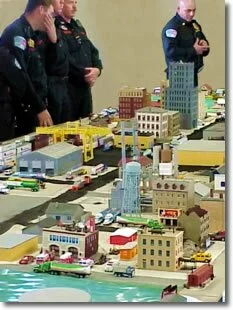
 Fire Department, Rescue and EMS Services Agencies
Fire Department, Rescue and EMS Services Agencies

